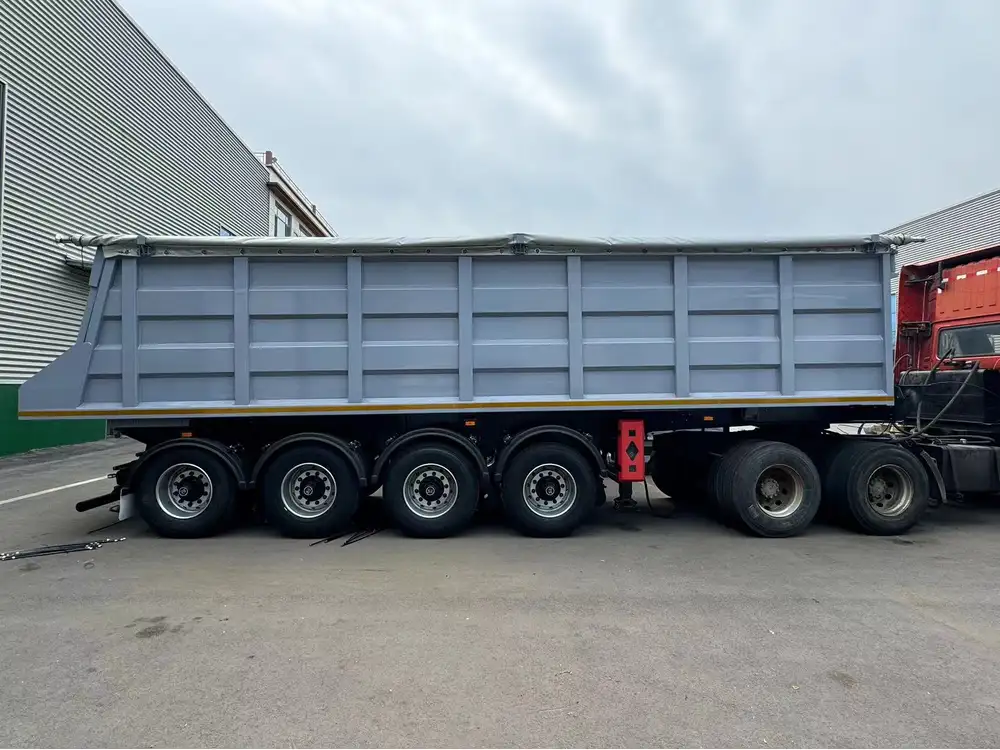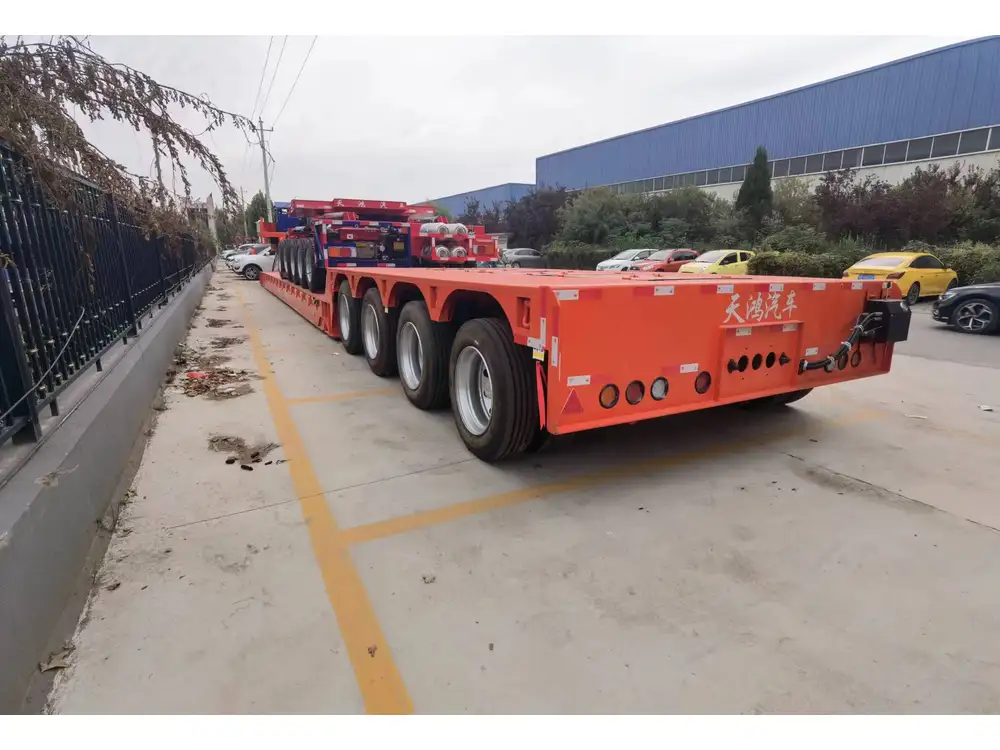When it comes to transporting heavy loads, flatbed trailers have established themselves as indispensable assets for numerous industries. Whether you’re in construction, agriculture, logistics, or moving, knowing where to buy or rent a flatbed trailer can significantly enhance your operational efficiency. Below, we delve into the various options available to you, examining features, benefits, and the process involved in securing the ideal flatbed trailer.
Understanding Flatbed Trailers
Flatbed trailers are characterized by their open platform design and lack of sides or a roof. This structure allows for the easy loading and unloading of cargo using cranes or forklifts, along with facilitating the transport of oversized items that may not fit within the confines of a standard enclosed trailer.
Common Types of Flatbed Trailers
| Trailer Type | Description | Typical Use Cases |
|---|---|---|
| Standard Flatbed | A versatile option for various loads. | General freight, machinery transport |
| Step Deck | Features a lower deck height for taller loads. | Shipping tall construction equipment |
| Drop Deck | Similar to a step deck but affording air ride capability. | Hauling oversized loads like vehicles |
| Double Drop Deck | Provides two lower sections, perfect for high loads. | Legal transport of high machinery |
| Removable Gooseneck | The neck detaches for easier loading and unloading. | Heavy equipment, oversized loads |
Each type serves specific needs, thus understanding these distinctions is crucial when deciding where to buy or rent a flatbed trailer.

New vs. Used Flatbed Trailers: What to Consider
Choosing between a new or used flatbed trailer involves various factors, including budget, frequency of use, and desired condition.
New Flatbed Trailers
Benefits:
- Warranty Protection: New trailers typically come with manufacturer warranties, ensuring peace of mind.
- Customizable Features: Buyers can often specify features, sizes, and specifications tailored to their operational needs.
- Latest Technology: New models include advanced safety and operational features, improving efficiency.
Potential Drawbacks:
- Higher initial cost than used alternatives.
Used Flatbed Trailers
Benefits:
- Cost-Effectiveness: Significantly lower price points make these options attractive for budget-conscious buyers.
- Immediate Availability: A wider range of inventory often allows for quicker acquisition.
Potential Drawbacks:
- Potential Maintenance Issues: Older trailers may come with unseen wear and tear.
- Limited Features: You may not find the most recent technological advancements.

Where to Buy Flatbed Trailers
Finding the right source to buy a flatbed trailer is vital for ensuring your investment pays off. Here are the primary avenues:
1. Manufacturer Direct
Purchasing directly from the manufacturer provides assurance in quality and reliability. Most manufacturers offer:
- Customization Options: Tailoring the trailer according to individual requirements.
- Factory Support: Access to direct communication for post-purchase support and maintenance advice.
2. Local Dealerships
Localized dealerships often stock a variety of trailers, catering to different needs:
- Personalized Service: Experts on-site can help guide your purchasing decision.
- Financing Options: Dealerships may have financing plans that make buying easier.

3. Online Marketplaces
In today’s digital age, numerous platforms connect buyers and sellers. Popular options include:
- eBay, Craigslist, and Facebook Marketplace: Great for both new and used options.
- Specialized Trailer Websites: Websites such as TrailerTrader or CommercialTruckTrader showcase diverse listings.
4. Auctions
If you’re looking for a bargain, auctions (both live and online) can provide excellent deals, though it’s essential to be cautious:
- Inspection Required: Always assess trailer condition before bids.
- Bidding Experience: Understand how to navigate the auction process to secure the best deal.
Renting Flatbed Trailers: A Viable Alternative
Renting a flatbed trailer can be an efficient solution when short-term transportation needs arise. Understanding your rental options is essential.

Benefits of Renting Flatbed Trailers
- Cost Savings: For infrequent users, renting eliminates the need for a large capital investment.
- No Maintenance Costs: Rental companies handle trailer maintenance and repairs.
- Flexibility: Quickly adapting to varying load types and volumes as business needs change.
Where to Rent Flatbed Trailers
Identifying reputable rental companies is crucial for a positive experience. Here are some top choices:
National Rental Chains
- Companies: Enterprise Truck Rental, U-Haul, and Penske.
- Pros: Extensive networks, tested reliability, and standardized pricing.
Local Equipment Rental Firms
- Pros: Personalized service and potentially more diverse options tailored to regional needs.
- Cons: Availability can vary based on demand.
Online Rental Platforms
- Options: Websites like Getaround or Turo focus on peer-to-peer rentals.
- Pros: Flexibility in terms and often lower cost.
Rental Agreements: What to Watch For
When renting a flatbed trailer, be diligent about reading the rental agreement:
- Insurance Requirements: Ensure you have adequate coverage.
- Usage Fees: Inquire about mileage limits and any additional fees for exceeding them.
- Return Policies: Understand the clean return policy to avoid unexpected charges.

Key Considerations When Purchasing or Renting
1. Load Capacity
Understanding the weight capacity is paramount in choosing a flatbed trailer. Assess your typical loads and ensure that the chosen trailer meets or exceeds these requirements.
2. Configuration
Flatbed trailers often come with various configuration options, including tie-down points, ramps, and dimensions. Make sure to consider your loading and unloading needs.

3. Material
The material of the trailer can heavily influence durability:
- Steel: Sturdier and heavier but more susceptible to rust.
- Aluminum: Lighter and resistant to corrosion, but typically pricier.
4. Price Range
On average, flatbed trailer prices vary significantly based on age, type, and condition:
- New Trailers: Range from $5,000 to over $40,000 depending on specifications.
- Used Trailers: Usually between $2,000 and $20,000 depending on wear and tear.
| Aspect | New Flatbed Trailer | Used Flatbed Trailer |
|---|---|---|
| Price Range | $5,000 – $40,000 | $2,000 – $20,000 |
| Warranty | Often included | Typically no warranty |
| Condition | Brand new, minimal wear | Variable condition, potential repairs |
| Availability | Ordered directly from the manufacturer | Wide availability, immediate access |
5. Regulatory Compliance
Ensure that the chosen trailer adheres to local regulations regarding dimensions and weight limits. Compliance is critical to avoid fines and ensure safe transportation.

Conclusion: Making the Right Choice for Your Flatbed Trailer Needs
Whether you choose to buy or rent, the journey to acquiring the ideal flatbed trailer involves comprehensive research and evaluation of your specific requirements. Understanding the types, configurations, and where to source these trailers empowers you to make an informed decision.
Investing time in identifying the right flatbed trailer not only optimizes your load capacity but also enhances your operational efficiency and contributes significantly to the success of your logistics endeavors. As the transportation landscape evolves, staying abreast of innovations in trailer technology and adaptations to user needs ensures sustained competitiveness in your industry.



